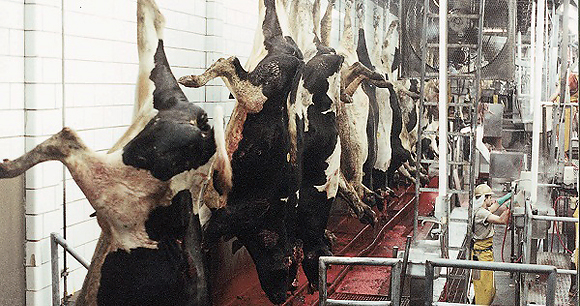
In early 2008, multiple instances of egregious cruelty to cattle at the Westland-Hallmark Meat Packing Co. in Chino, California, caught on videotape by animal protection advocates, resulted in widespread public outrage and eventually led to the largest beef recall in the history of the United States. This incident occurred despite the continual on-site presence of US Department of Agriculture inspection personnel and the periodic performance of third-party humane slaughter audits at the plant.
In the aftermath of Westland-Hallmark, Congress held multiple hearings on humane slaughter, and the USDA’s Food Safety and Inspection Service (FSIS) took several actions to step up its enforcement of the federal Humane Methods of Slaughter Act (HMSA), including conducting an audit of slaughter plants at high risk for humane violations, temporarily increasing the time spent verifying humane handling and slaughter requirements, and issuing a humane slaughter notice and additional training modules for in-plant inspection personnel.
The cruel treatment of animals at slaughter shocked the nation for a second time about 18 months later when egregious mistreatment of nonambulatory, week-old calves at Bushway Packing in Grand Isle, Vermont, was captured on video. No less than four egregious incidents occurred over a six-month period before the FSIS finally suspended the plant indefinitely. Again, Congress held hearings, and once again FSIS took action, this time establishing an ombudsman office for FSIS personnel needing direction and support on humane slaughter enforcement and agreeing to grant a petition to ban the slaughter of nonambulatory calves.
Instances of inhumane slaughter continue, however. FSIS inspectors temporarily shut down operations at Central Valley Meat in Hanford, California, in August 2012 after receiving a video shot by animal protection advocates that showed nonambulatory cows being handled inhumanely. The federal government and McDonald’s Corporation suspended purchases of beef from the plant in response. The plant was eventually allowed to reopen after agreeing to make a number of changes, including requiring workers to undergo training in the humane treatment of animals on a quarterly basis.
While it may not be possible to avoid all incidents of animal suffering at slaughter, more must be done to reduce inhumane handling at slaughter, particularly that which is egregious and clearly preventable in nature. In an attempt to determine whether regulatory changes could be made to prevent inhumane slaughter—and what those changes might be—AWI conducted a review of more than 1,000 incidents of inhumane handling and slaughter occurring at state and federally inspected slaughter establishments over a recent six-year period. Based on its analysis, AWI concluded that several simple and straightforward amendments to HMSA regulations could significantly reduce the occurrence of inhumane treatment of animals at US slaughter plants.
AWI submitted a petition urging the USDA to adopt these regulations in 2013. When the USDA did not respond for three years, AWI sued under the Administrative Procedure Act to force the department to act.
Click here to read more about humane slaughter.
Case Name: Animal Welfare Institute v. US Department of Agriculture
Nature of Case: The Animal Welfare Institute brought claims against the US Department of Agriculture (USDA) for failing to respond to a petition to promulgate regulations under the Humane Methods of Slaughter Act (HMSA) to reduce incidents of inhumane slaughter of cattle, pigs, sheep, and goats.
Court: US District Court, District of Columbia
Year Filed: 2016
Plaintiffs: Animal Welfare Institute
Defendants: United States Department of Agriculture, Food Safety and Inspection Service
Status: AWI’s suit was mooted when the USDA denied AWI’s petition for rulemaking on February 21, 2017. The case was dismissed. In USDA’s denial, it emphasized that while it did have authority to engage in rulemaking on this topic, it would not do so. The USDA reasoned that it was optimistic that voluntary compliance systems rather than rulemaking would be sufficient to remedy the problems identified in AWI’s petition.
Relevant Documents:
Selected Case Media:
- AWI Sues USDA for Failure to Prevent Suffering of Animals at Slaughter – AWI Press Release, December 14, 2016.